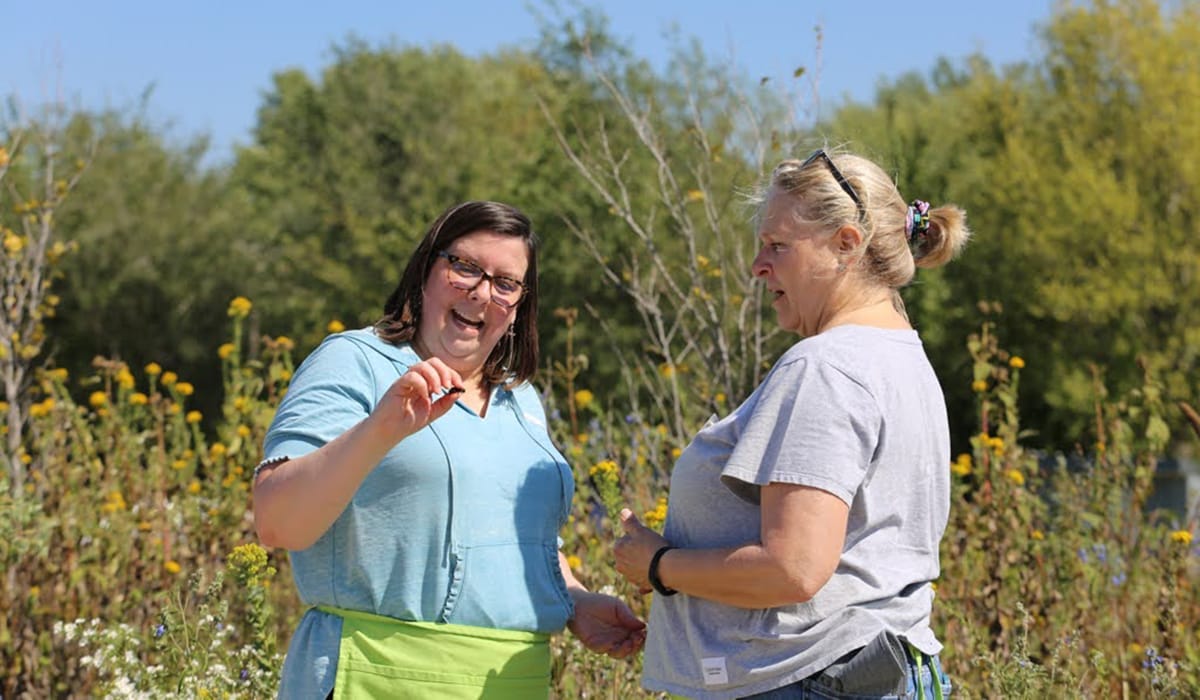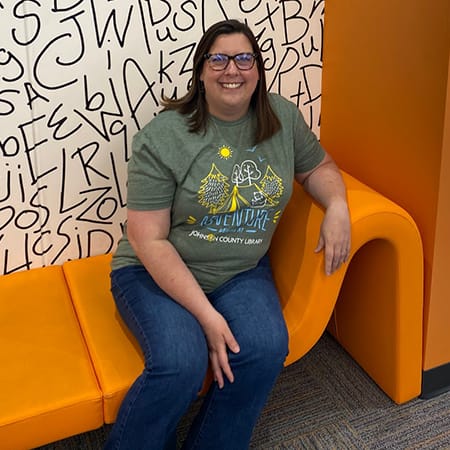Data Analyst Gives Immigrants Tools to Build a New Life

Meet Daily Point of Light Award honoree Jessica Kueker. Read her story, and nominate an outstanding volunteer or family as a Daily Point of Light.
Jessica Kueker, 48, likes to contribute. She spends her weekdays managing data at a biotech company doing trials for an oncology drug. In short, she reviews data for cancer studies. She and her husband also care for a teenager, two cats, a corn snake and a leopard gecko.
Inspired by her grandmother towards the end of her Girl Scout tenure, Jessica discovered yet another way to support the people around her.
Since September 2022, she has been teaching free English Language Learner classes at Johnson County Library, motivating students originally from all over the world to return week after week.
Her 16-year-old daughter, an aspiring linguist, has discovered the power of language herself and joins her for Saturday morning classes. Jessica lets other volunteers shadow her and her co-teacher, mentoring them as they proceed to teach their own classes. As a certified master naturalist, she also educates the community and volunteers on projects that support the management of natural resources.

What inspires you to volunteer?
I started volunteering as a Girl Scout leader when my daughter was in kindergarten. I did that for around seven years, until she started middle school and was not as interested as she once was. I was on the library website looking for volunteer opportunities for her, and I came across their ad for English Learner conversation teachers. My Girls Scout days were winding down. I had time and wanted to keep volunteering. At the same time, I also started the 40-hour certification process to be a Johnson County Master Naturalist through the K-State extension office.
What inspired you to get started with this initiative?
My 92-year-old grandmother volunteered at the women’s prison for a long time. She and my mom both have done a lot of volunteer work. My grandmother has always lamented the fact that she never helped people learn English. That was one thing on her volunteer list that she never got to do, and she feels like she’s too old to do it. So, I applied.
Tell us about your volunteer role with ELL at the library.
Each instructor designs their own curriculum, handouts, slides, etc. based on the level of their class. Madhavi Menon, my co-teacher, and I teach students who have little to no knowledge of English. The library also has instructors for intermediate and advanced. Each trimester, the library invites people for an in-person interview to assess their English level through a series of questions.
While one of us is teaching, the other can go around and help people. My daughter is in Spanish 4 in high school, and she loves foreign languages. She helps people with pronunciation or, if we have them speaking in groups, will walk around with us and listen to each person.
Each week, we’ll have a topic. The first one will just be introductions and small talk. We might do a situational lesson on going to the grocery store and practice asking, “Excuse me, where can I find the corn flour?” The goal is to get them to practice and have fun. Everyone wants to work on pronunciation, because a lot of people are shy about their accents. It makes them very nervous to ask questions in public.
Do you tutor?
Dalia, a Syrian student in her twenties who was in one of my first classes, has been coming ever since and asked if I would tutor her one-on-one. I do an extra two hours a week with her. That’s more structured, because she wants to go to college, and to do that, she needs to know English. She didn’t know any when she started. She had her English-speaking niece with her to help translate and feel more comfortable. After that, she was able to come on her own.
It’s amazing watching people who have different alphabets—like Arabic speakers—progress. The learning curve is so much higher. Dalia has worked so hard, and I’m so proud of her. She had a baby and only took off a couple of months.
A lot of immigrants are isolated in different communities. Dalia doesn’t drive. She spends a lot of time with her family, and they speak Arabic. A lot of my Spanish-speaking students work in places where there are a lot of Spanish-speakers, so even at work, they speak Spanish. It’s really hard, and it’s a slow process to learn English if you’re not out there speaking it every chance you can get.
Are most of your students adults?
They’re all adults. About 75% speak Spanish and are mainly from Mexico or South and Central America. The rest are from everywhere else. We’ve had people from China, Afghanistan, Russia, Ukraine and more.
What are your long-term plans or goals for the organization?
I’d love to start a teen program. Parents come in with children, and we don’t have a program for them. And it would be cool to have one or two of our Spanish-speaking students hold a conversation class for people who want to improve their Spanish.
What’s been the most rewarding part of your work?
Seeing students progress and become more comfortable in the world is so satisfying. Seeing a person like Dalia, who is able to now go to a restaurant, understand what she reads and order for herself is so rewarding.
What have you learned through your experiences as a volunteer?
I’m humbled and awed at our students’ dedication. It’s really difficult to learn a second language as an adult. Also, you have to throw your assumptions aside. People who don’t speak English are not undocumented. Our students are all here legally. A lot of our students have college degrees. Many college-educated people are working at warehouses, packing boxes for Amazon or JCPenney. They give up a lot to come to the United States and contribute.
Do you have any tips for facilitating conversation with someone with a low level of English?
Smile and introduce yourself. Ask if they need any help. Speak slowly, and keep trying. There are many ways to communicate non-verbally, so if you can’t get your point across initially, just keep trying, because you’ll eventually figure it out.
Do you want to make a difference in your community like Jessica? Find local volunteer opportunities.
